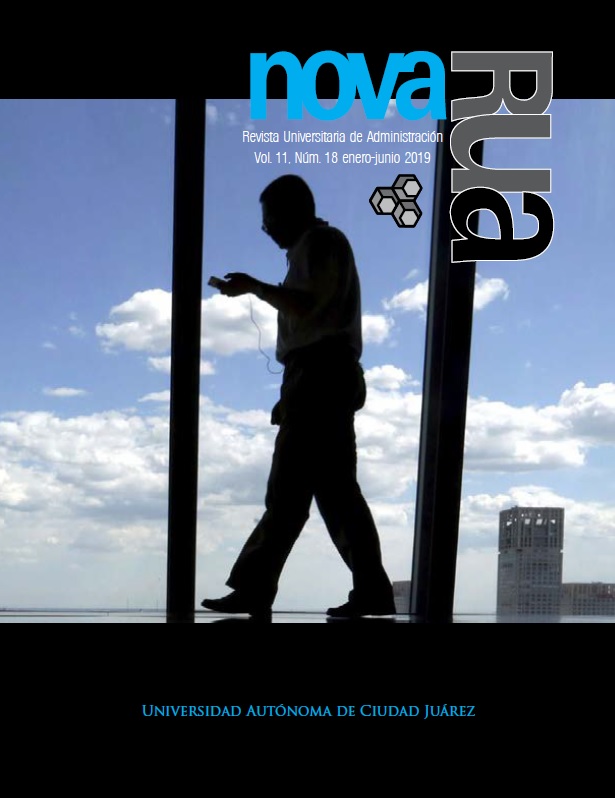Adjustment and support in preparation of retirement: an approach from socialization
DOI:
https://doi.org/10.20983/novarua.2019.18.4Keywords:
Retirement socialization, preparation for retirement, support for retirement, adjustment for retirementAbstract
Retirement as a process of learning and socialization, rather than as a break or departure from the work environment, favors its preparation by visualizing it as the start of a new life stage with different characteristics and role from those previously lived. The objective of this study is to acknowledge retirement’s preparation, the expected social support and the adjustment factors for retirement in workers with many years of work experience and close to retirement, also byidentifying, how they describe retirement, how should they face to old age and the affectation they would have with the change of role in retirement. The research is of qualitative nature, narrative design of topic, multi-case study research strategy through judgment sampling from employees close to their retirement from various companies using an interview data collection technique and a structured interview guide instrument. Results reveal that they do consider retirement preparation useful, that the social support they expect comes from the family and consider that stress is a mismatch factor when deciding to retire.
References
Aguilió, M. S. (1996). La jubilación ¿cómo es vivida en nuestros días? En Calidad de vida en la vejez, Actas del Congreso Nacional celebrado en Burgos, 12, 13, 14 de diciembre (pp. 129- 138). España: Facultad de Humanidades y Educación, Universidad de Burgos.
Bruno, F. y Acevedo, J. (2016). Vejez y sociedad en México: Las visiones construidas desde las Ciencias Sociales. Forum Sociológico, Serie II, 29: 7-20. DOI :10.4000/sociologico.1453.
Carbajo, M. C. (2009). Mitos y estereotipos sobre la vejez. Propuesta de una concepción realista y tolerante.Ensayos Revista de la Facultad
de Educación de Albacete, 24: 87-96.
Cruz, R. (2011). Retiro laboral y ajuste a la jubilación de hombres y mujeres en la mediana edad. Revista Electrónica Actualidades Investigativas en Educación, 11(1): 1-28. Recuperado de http://www.redalyc.org/articulo.oa?id=44718060016.
Chiesa, R. y Sarchielli, G. (2008). Prepararse para la jubilación: el papel del apoyo social en la gestión de la ansiedad. Revista de Psicología del Trabajo y de las Organizaciones, 24(3): 365-388. Recuperado de http://scielo.isciii.es/pdf/rpto/v24n3/v24n3a06.pdf.
Guevara, M. E. (2013). Preparación para la jubilación: diseño de un programa de acompañamiento psicológico. Revista Visión Gerencial, 12(1): 103-122.
Hernández, G. (2009). Cese de la actividad profesional y preparación para la jubilación. Cuadernos de Relaciones Laborales, 27(2): 63-81.
Hernández, R., Fernández-Collado, C. y Baptista, P. (2014). Metodología de la investigación (6.º ed.). Ciudad de México: McGraw Hill Education.
Katayama, R. (2014). Introducción a la investigación cualitativa: fundamentos, métodos, estrategias y técnicas. Lima, Perú: Fondo Editorial de la Universidad Inca Garcilaso de la Vega.
Madrid, A. J. y Garcés de los Fayos, E. J. (2000). La preparación para la
jubilación: revisión de los factores psicológicos y sociales que inciden en un mejor ajuste emocional al final del desempeño laboral. Anales de psicología, 16(1): 87-99.
Mejía, J. (2000). El muestreo en la investigación cualitativa. Investigaciones sociales, 4(5): 165-180.
Organización de las Naciones Unidas (1983). Vienna International Plan of Action on Aging. Nueva York: ONU. Recuperado de https://www.un.org/es/globalissues/ageing/docs/vipaa.pdf.
Pinazo, S. (2005). El apoyo social y las relaciones sociales de las personas mayores. En Pinazo, S. y Sánchez, M, Gerontología. Actualización, innovación y propuestas, Madrid: Pearson Prentice-Hall.
Sáez, N., Meléndez, J., Rico, M. A. y De Vicente, P. (1993). Preparación a la jubilación. En Rubio, R. y Muñoz, J., Gerontología social. Perspectivas teóricas y de intervención (pp. 167-220). España: Diputación de Jaén.
Trujillo, C., Naranjo, M., Lomas, K. y Merlo, M. (2019). Investigación cualitativa. Epistemología, métodos cualitativos, ejemplos prácticos, entrevistas en profundidad. Ecuador: Editorial UTN.
Yanguas, J. (2006). Análisis de la calidad de vida relacionada con la salud en la vejez desde una perspectiva multidimensional. Colección Estudios Serie Personas Mayores. Madrid, España: Ministerio de
Trabajo y Asuntos Sociales, Secretaría de Estado de Servicios Sociales, Familias y discapacidad e Instituto de Mayores y Servicios Sociales (IMSERSO). Recuperado de http://www.carm.es/ctra/cendoc/haddock/13286.pdf.
Wang, M. y Shultz, K. (2009). Employee retirement: a review and recommendations for future investigation. Journal of Management,
(1): 172-206. DOI: 10.1177/0149206309347957
Downloads
Published
Issue
Section
License
Copyright (c) 2020 María Elizabeth Fernández Solís, Carmen Patricia Jiménez Terrazas

This work is licensed under a Creative Commons Attribution-NonCommercial-ShareAlike 4.0 International License.
All contents of the electronic edition of the journal are distributed under a license and distribution "Creative Commons Attribution-Noncommercial-ShareAlike 4.0 International" (CC-BY-NC-SA). You can see from here the informative version of the license.
Those authors/publications as having this journal agree to the following terms:
a) Is allowed and recommends authors / as disseminate their work via the Internet (p. eg .: institutional telematic files or on their website), which can produce interesting exchanges and increase appointments of the published work. (See The Effect of Open Access).












